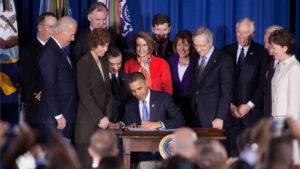
President Barack Obama signed the Don’t Ask, Don’t Tell Repeal Act of 2010 during a ceremony at the Interior Department in Washington on Dec. 22, 2010. (Official White House Photo by Chuck Kennedy)
WASHINGTON — VA Secretary Denis McDonough sent guidance to Veterans’ Benefit Administration adjudicators restating that veterans who were given other than honorable discharges under the military’s former Don’t Ask, Don’t Tell (DADT) policy are eligible for the full range of VA benefits.
The announcement came on the 10th anniversary of the repeal of DADT, which barred open gay, lesbian and bisexual members from serving in the military.
VA officials noted that this does not represent a change in the law, since veterans who were discharged under DADT alone have been eligible for benefits under existing statutes. However, this has not always been broadly understood by veterans or properly enacted by VBA adjudicators.
Some members of Congress believe that this VA regulation should be codified into law so that it will be harder to reverse by a less LGBTQ-friendly administration.
Don’t Ask, Don’t Tell was put into place by President Bill Clinton in 1994. Clinton had expressed interest in fully overturning the existing military policy dating back to World War II that empowered the services to root out and discharge from the ranks anyone engaged in homosexual acts. An estimated 100,000 servicemembers were discharged under this policy between World War II and the enactment of DADT.
Clinton’s goal was blunted when a military working group found that homosexuality was not consistent with military culture. DADT was created as a compromise. Homosexuals could still serve in the military, but only if they kept their sexuality a secret. In exchange, their superiors were forbidden from inquiring about it.
The enactment of the policy was framed by the Clinton administration as a win for LGBTQ servicemembers, who would not have to fear being actively outed by their superiors. However, during the 17 years that DADT was in effect, an additional 14,000 servicemembers were discharged for being gay. In hindsight, it’s become clear that DADT represented little real change in military culture and had a profoundly traumatic impact on LGBTQ servicemembers.
‘Dire Consequences’
“The history of anti-LGBTQ policies in the military has had dire consequences on sexual and gender minorities, as they’ve experienced formal discipline, incarceration, career and relationship consequences, dishonorable discharges, harassment, violence, retaliation and fear,” declared Jennifer Dane, CEO of the Modern Military Association of America, at a hearing of the House VA Subcommittee on Oversight last month. “This occurred not only during their time of service, but it’s lasted far beyond that. And some of those have resulted unfortunately in suicide.”
According to VA leaders, the department recognizes that many LGBTQ veterans impacted by DADT, as well as by previous homophobic policies, have not come forward to apply for a discharge upgrade, believing the process would be long and unpleasant. According to a study conducted by The Associated Press in 2016, less than 8% of those discharged under DADT had applied for an upgrade as of that year. The agency hopes this public clarification of the benefits rules will help reach the remaining 92%.
“We are focused on creating a culture guided by principles such as empathy and accountability, to review and rethink policies and programs that may have caused unintended barriers,” declared Harvey Johnson, VA’s deputy assistant secretary for resolution management, diversity, and inclusion while testifying at the subcommittee hearing. “It’s a call to action to claimants … [as well as] to VA claims processors and adjudicators. Engage your local VA. Come back to us. We’ll look at your character of discharge. We will look at your record. We will look at what you are eligible for.”
If a benefits claim is denied because of the character of a veterans’ discharge, it will automatically be sent to VA’s central office for a second review. This applies to all claims that are denied due to character of discharge, not just LGBTQ veterans.
According to Johnson, VA is conducting a series of listening sessions with veterans and stakeholders in early October in preparation for a final rule change that may go beyond the guidance given by McDonough last month.
Some lawmakers believe VA’s new policy, whatever final form it takes, will require legislative support. Two weeks prior to VA’s announcement, Democrats on the House VA Committee reintroduced the Securing the Rights our Veterans Earned (SERVE) Act. In short, the bill would make law VA’s policy on veterans with DADT discharges being eligible for benefits. It would also expand VA benefits to include veterans discharged solely due to sexual orientation or gender identity between World War II and DADT, as well as those discharged under the previous ban on transgender servicemembers.
VA has not lent its support to the bill, noting that the legislation may hurry the department’s own internal processes.
“Eligibility for benefits is complex and we would appreciate the chance to discuss the bill and its intended results with the committee before it takes further actual action,” Johnson testified. “The rule-making process is hard work, and I believe we are doing the hard-work now to meet with VSOs, affinity groups, veterans at listening sessions… All of that is happening now.”


